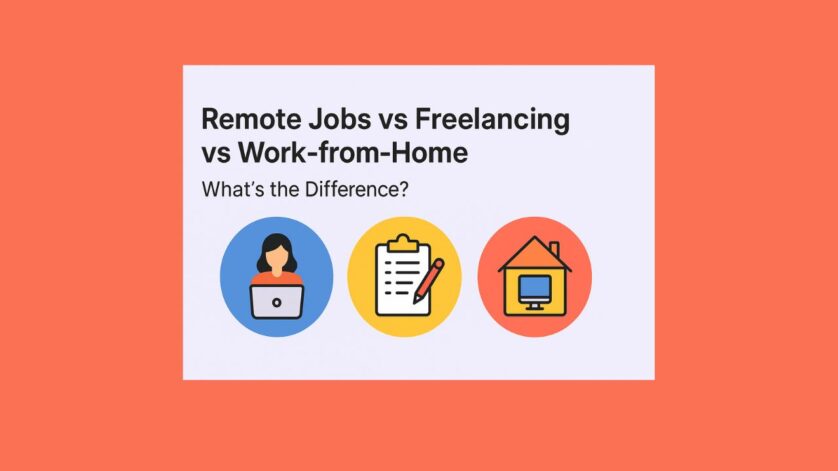✅ Introduction
In today’s digital world, terms like remote jobs, freelancing, and work-from-home are used frequently — often interchangeably. But are they the same? The answer is no.
If you’re planning to build a career that allows you to work from the comfort of your home or anywhere in the world, it’s essential to understand the difference between these three models.
In this blog, we’ll break down:
- The meaning of each term
- Key differences
- Pros and cons
- Which one is right for you
🏢 What Is a Remote Job?
A remote job is a traditional employment role where you work for a company but do not need to be physically present in the office.
🔸 Key Features:
- Full-time or part-time employment
- Regular monthly salary
- Benefits like health insurance, paid leave (depending on the company)
- Fixed working hours (mostly)
- Work from home, co-working spaces, or anywhere
🔸 Examples of Remote Jobs:
- Customer Support Associate
- Remote Software Developer
- Content Writer for a media company
- Digital Marketing Executive for an agency
🔸 Pros of Remote Jobs:
- Job security
- Fixed income
- Employee benefits
- Growth opportunities within the company
🔸 Cons of Remote Jobs:
- Fixed work timings
- Employer monitoring tools (sometimes)
- Less flexibility compared to freelancing
💻 What Is Freelancing?
Freelancing means working as an independent contractor. You are self-employed and offer services to multiple clients instead of being tied to one employer.
🔸 Key Features:
- You choose your clients
- Paid per project, hour, or task
- No fixed salary — earnings depend on work volume
- You handle your taxes and benefits
- High flexibility in choosing work
🔸 Popular Freelancing Fields:
- Graphic Design
- Content Writing
- Digital Marketing
- Programming & Web Development
- Virtual Assistance
- Video Editing
🔸 Pros of Freelancing:
- Flexible working hours
- Higher earning potential if skilled
- Work with multiple clients
- Freedom to choose projects
🔸 Cons of Freelancing:
- Income instability
- No employee benefits (insurance, leaves, etc.)
- Requires self-discipline
- You are responsible for finding clients
🏠 What Is Work-from-Home?
Work-from-home (WFH) is simply a work location style, not a job type.
🔸 Explanation:
- WFH means doing your job or freelance work from your home.
- Both remote jobs and freelancing can be classified as “work-from-home” if you choose to work from home.
🔸 Work-from-Home Can Include:
- Remote job for a company
- Freelancing gigs
- Running an online business (e-commerce, blogging, consulting)
- Teaching online
🔸 Pros of Work-from-Home:
- Save on commute time and costs
- Comfort of home environment
- Better work-life balance (if managed well)
🔸 Cons of Work-from-Home:
- Distractions at home
- Loneliness or isolation
- Work-life boundaries can blur
🔍 Remote Jobs vs. Freelancing vs. Work-from-Home: Key Differences Table
| Feature | Remote Job | Freelancing | Work-from-Home |
|---|---|---|---|
| Type | Employment | Self-employed | Work location |
| Income | Fixed salary | Project-based | Depends on job type |
| Benefits | Yes (health, leaves, etc.) | No | Depends (job or freelance) |
| Flexibility | Moderate | High | High (if freelancing) |
| Stability | High | Variable | Variable |
| Work Location | Home, café, co-working space | Anywhere | Home |
| Responsibility | Company-driven | Self-driven | N/A (just location) |
🎯 Which One Is Right for You?
Choosing between remote jobs, freelancing, and work-from-home depends on:
- Income Needs: Want stable income? Go for remote jobs. Want higher income with risk? Freelancing.
- Flexibility: Freelancing offers more flexibility. Remote jobs are more structured.
- Personality: If you love freedom and variety, freelancing works best. Prefer routine? A remote job fits.
- Skills: Freelancing needs more entrepreneurial skills like client management and negotiation.
✅ Conclusion
To summarize:
- A remote job is a full-time job where you don’t go to the office but work for one employer.
- Freelancing means self-employment where you work for multiple clients.
- Work-from-home simply describes your workplace — it can apply to both remote jobs and freelancing.
Each option has pros and cons. Choose what aligns best with your lifestyle, financial needs, and career goals.
🔗 Need Remote Job Updates?
Check the latest genuine remote job listings on RemoteJobsly.in. Updated daily!

